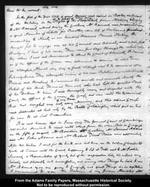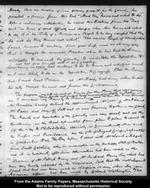Major Hawley would do nothing without me, and without Major Hawley the Committee could do nothing. I must be invited and must be present at every Meeting. This Attachment of the Major to me, I soon perceived and often afterwards perceived was an Eye Sore to some Gentlemen. I have seen at Antwerp, an admirable Picture by one of the flemish Masters of the Saviour and his Disciples. The Saviour is represented as shewing to the beloved Disciple John, some peculiar marks of his tender Affection and Friendship for him. The Eyes of all the Disciples are turned to those two principal figures, and these Partialities are observed by them all. The Artist understood human Nature so well, that he had stamped a jealousy on every Countenance, especially on that of St. Peter whose Eyes allmost start out of his head with it. The Painter knew that the holiest Men were Men still. I must declare that my Experience has been conformable to that of the Painter. I have never known in the Course of my whole Life any Man however exalted in Rank, Genius, Talents, Fame, Fortune or Virtue, in whom I have not seen disgusting Instances and proofs of this Passion. I will not say that I have never felt them in myself, but I will say I have been always on my guard against them and always endeavoured to suppress them and that I never took one Step to supplant any Man from such Motives. I had reason to make this Observation at the time. I saw in Mr. Hancock and Mr. Samuel Adams very visible marks of jealousy and Envy too at this superiour Attachment of Major Hawley to me. I regarded it very little and it made no Alteration in my respectful and friendly behaviour to them. The Draught of a Report was full of very popular Talk and with those democratical Principles which have since done so much mischief in this Country. I objected to them all and got them all expunged which I thought exceptionable, and furnished the committee with all the Law Authorities, and all the legal and constitutional Reasonings that are to be seen on the part of the House in that Controversy. How these Papers would appear to me or to others, at this day I know not, having never seen them since their first publication: but they appeared to me, at that
Page 2
1773. 1774.
time to be correct.
In the fall of the Year 1773, a great Uproar was raised in Boston, on Account of the Unlading in the Night of a Cargo of Wines from the Sloop Liberty from Madeira, belonging to Mr. Hancock, without paying the Customs. Mr. Hancock was prosecuted upon a great Number of Libells for Penalties, upon Acts of Parliament, for about amounting to Ninety or an hundred thousand Pounds Sterling. He thought fit to engage me as his Counsell and Advocate; and a painfull Drudgery I had of his cause. There were few days through the whole Winter, when I was not summoned to attend the Court of Admiralty. It seemed as if the Officers of the Crown were determined to examine the whole Town as Witnesses. Almost every day a fresh Witness was to be examined upon Interrogatories. They interrogated many of his near Relations and most intimate Friends and threatened to summons his amiable and venerable Aunt, the Relict of his Uncle Thomas Hancock, who had left the greatest Part of his Fortune to him. I was thoroughly weary and disgusted with the Court, the Officers of the Crown, the Cause, and even with the tyrannical Bell that dongled me out of my House every Morning; and this odious Cause was suspended at last only by the Battle of Lexington, which put an End for ever to all such Prosecutions.
It is well known that in June 1774 The General Court at Cambridge appointed Members to meet with others from the other States in Congress on the fifth of August. Mr. Bowdoin, Mr. Cushing,
Mr. Samuel Adams,
and Mr. John Adams and Mr. Robert Treat Paine were appointed. After this Election I went for the tenth and last time on the Eastern Circuit: At York at Dinner with the Court, happening to sit at Table next to
Mr. Justice Seward, a Representative of York, but of the unpopular Side, We entered very sociably and pleasantly into conversation, and among other Things he said to me,
Mr. Adams you are going to Congress, and great Things are in Agitation. I recommend to you the Doctrine of my former Minister Mr.
Page 3
Mr. Moody. Upon an Occasion of some gloomy prospect for the Country, he preached a Sermon from this text "And they know not what to do." After a customary introduction, he raised this Doctrine from his Text, that "in times of great difficulty and danger, when Men know not what to do, it is the Duty of a Person or a People to be very careful that they do not do, they know not what." This oracular jingle of Words, which seemed, however to contain some good Sense, made Us all very gay. But I thought the venerable Preacher when he had beat the Drum ecclesiastic to animate the Country to undertake the Expedition to Louisbourg in 1745,
and had gone himself with it as a Chaplain, had ventured to do he knew not what, as much as I was likely to do in the Expedition to Congress. I told the Deacon that I must trust Providence as
Mr. Moody had done, when he did his duty though he could not foresee the Consequences.
To prepare myself as well as I could, for the Storm that was coming on, I removed my Family to Braintree.
They could not indeed have remained in Safety in Boston, and when the time arrived Mr. Bowdoin having declined the Appointment Mr. Cushing,
Mr. Adams, Mr. Paine and
myself,
satt out on our journey together in one Coach. The Anxiety and Expectation of the Country was very great, and all the Gentlemen on the Road assembled from place to place to escort Us all the Way to Philadelphia, especially in
Connecticutt, New York, the Jersies and
Pensilvania. On the 5th of August
[September] Congress assembled in Carpenters Hall. The Day before, I dined with Mr. Lynch a Delegate from South Carolina, who, in conversation on the Unhappy State of Boston and its inhabitants, after some Observations had been made on the Eloquence of
Mr. Patrick Henry and Mr. Richard Henry Lee, which had been very loudly celebrated by the Virginians, said that the most eloquent Speech that had ever been made in Virginia or
any where else, upon American Affairs had been made by
Colonel Washington. This
Page 4
was the first time I had ever heard the Name of
Washington, as a Patriot in our present Controversy, I asked who is
Colonel Washington and what was his Speech?
Colonel Washington he said was the officer who had been famous in the late
french War and was in in the Battle in which Braddock fell. His Speech was that if the Bostonians should be involved in Hostilities with the British Army he would march to their relief at the head of a Thousand Men at his own
expence. This Sentence
Mr. Lynch said, had more Oratory in it, in his judgment, than all that he had ever heard or read. We all agreed that it was both sublime, pathetic and
beautifull.
The more We conversed with the Gentlemen of the Country, and with the Members of Congress the more We were encouraged to hope for a general Union of the Continent. As the Proceedings of this Congress are in Print, I shall have Occasion to say little of them. A few Observations may not be amiss. After some days of general discussions, two Committees were appointed of twelve members each, one from each State, Georgia not having yet come in. The first Committee was instructed to prepare a Bill of Rights as it was called or a Declaration of the Rights of the Colonies: the second, a List of Infringements or Violations of those Rights. Congress was pleased to appoint me, on the first Committee, as the Member for Massachusetts.
It would be endless to attempt even an Abridgment of the Discussions in this Committee, which met every day for many regularly every Morning, for many days successively, till it became an Object of jealousy to all the other Members of Congress. It was indeed very much against my judgment, that the Committee was so soon appointed, as I wished to hear all the great Topicks handled in Congress at large in the first Place. They were very deliberately considered and debated in the Committee however. The two Points which laboured the most, were 1. Whether We should recur to the Law of Nature, as well as to the British Constitution and our American Charters and Grants. Mr. Galloway and Mr. Duane were for excluding the Law of Nature. I was very strenuous




